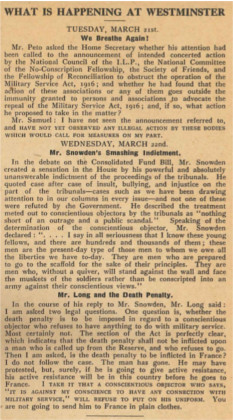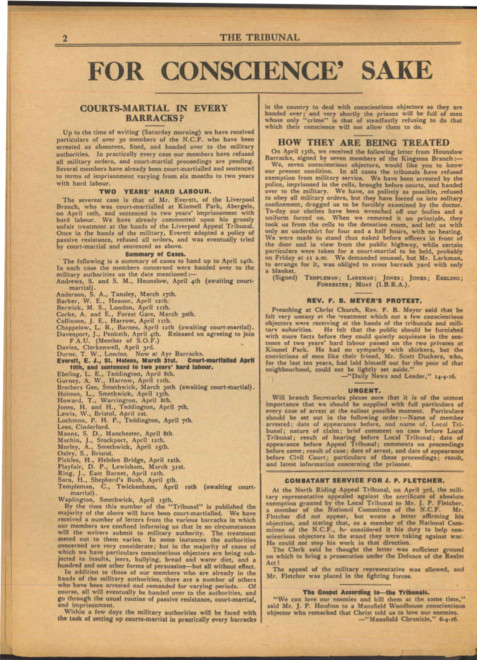
| HOME | TRIBUNAL HOME |
April 1916
By April 1916, the No-Conscription Fellowship had grown in numbers, political capital and support. Thousands of men had registered their opposition to war as Conscientious Objectors and the circulation of the Tribunal had grown, with NCF branch offices around the country receiving ever larger numbers of requests for issues.
April is the first month that the Tribunal “settles down” into the format, layout and content that it would adhere to for the rest of the print run. Each issue contained a leading article, usually by a prominent Conscientious Objector, though religious figures, philosophers and foreign correspondents would sometimes be featured, usually accompanied by a quotation on peace, war or objection. This would be followed by a tally of the increasing numbers of COs in prison, held by the army, or facing court martial. After this tally, a series of shorter articles aimed to keep COs and their supporters informed of developments in Parliament, stories from regional tribunals, and updates from Conscientious Objectors around the country.
This second month of the Tribunal was printed against a backdrop of increasing dissatisfaction with the provisions of the Military Service Act. Already deeply unpopular, the machinery of conscription was by now exposed as venal, self-serving and incompetent. Wildly varying treatment of Conscientious Objectors had been exposed, while the determination of some Military Service Tribunals to dismiss any and all men with a conscientious objection to military service was rapidly showing that the Local Government Board’s assertion that the members were doing a difficult job well was simply false.
Three articles from the April 1916 Tribunal stand out as particularly important to the story of conscientious objection.
April 6th: “NO COMPROMISE”
NO COMPROMISE forms the leader article of the April 6th issue. It makes several very important points, but the strength of the text, written by Clifford Allen, means that it needs little explanation. The article lays out the foundation of what would become the “Absolutist” stand, urging COs not just to resist militarism but to be prepared for any and all hardships that they would face. Some extracts lay out the commitment and philosophy of the Absolutist CO:
“Let us assume that judged by all practical standards we are unavailing in our resistance to the incoming tide of military depotism. Could that make one atom of difference to our individual sense of right and wrong?”
“Thousands of men who are now fighting on the battlefield are doing so from a high sense of duty and in the noblest spirit of sacrifice. Those of us who believe war is wrong and are prepared to suffer for the cause of peace must surely have some point of contact with those who are suffering because of a real sense of duty on the battlefield”
“If we now remain unconquerable in our desire to serve our fellow-men in the cause of peace, we may establish the foundations upon which true national service will be built, so that men... will in peace refuse to countenance the the exploitation of one class over another, or the degradation of one individual by another.
At our convention let us dedicate ourselves to such service for the remainder of our lives”
This article lays down very clearly the absolute certainty that many Conscientious Objectors felt about their opposition to war. It shows that they understood it would be a difficult and dangerous struggle but one that could, and should, be won. Clifford Allen’s strong language and reference to struggle and sacrifice was deliberate - to encourage COs to resist everything that the government and the military would soon begin to throw at them, the first evidence of which was printed over the page in an ominous article - “THE PERSECUTION BEGINS”.
The April 6th issue was the first to report consistently on civil arrests and the transfer of COs to direct military authorities. Clifford’s NO COMPROMISE article formed a strong appeal to COs and their supporters around the country - that members of the NCF would “never have any intention of faltering when the test came”
March 30th: “WHAT IS HAPPENING IN WESTMINSTER”
Reporting from the House of Commons, the Tribunal records Walter Long, President of the Local Government Board:
“I am asked two legal questions. One question is, whether the death penalty is to be imposed in regards to a CO who refuses to have anything to do with military service.
Most Certainly Not”
This article must have been a relief to COs worried about the Army’s longstanding predilection for corporal and capital punishments. As some would suggest that a CO was “legally a soldier” despite their objection to war, Walter Long’s assertion that a CO would not face the death penalty seemed to give a little more legal protection for men who refused to obey any military order. Just how effective this statement was at enforcing this protection would be seen later in 1916.
April 20th: “FOR CONSCIENCE’ SAKE”
For Conscience’ Sake is the first in what would become the Tribunal’s longest running series of articles forming a consistent record of the journeys of Conscientious Objectors through the civil and military systems. Previous to this issue the main focus of the Tribunal had been on the experiences of COs at Tribunal - from now on it would become the punishments inflicted on men who defied their Tribunal hearing.
 These articles consist of several sections - first a tally, in this issue limited to only thirty two COs facing court martial for disobeying military orders or sent before a magistrates court as an absentee from the Army. This number would soon grow, but in April the numbers were small enough to list each man and the situation he found himself in.
These articles consist of several sections - first a tally, in this issue limited to only thirty two COs facing court martial for disobeying military orders or sent before a magistrates court as an absentee from the Army. This number would soon grow, but in April the numbers were small enough to list each man and the situation he found himself in.
After the tally, relevant letters or summaries of CO experiences would be included. The April 20th issue contains a short letter from members of the Kingston branch of the NCF relating their experiences at Hounslow barracks and is the first indication of the harsh treatment COs would face around the country:
“We have, as politely as possible, refused to obey all military orders, but they have forced us into solitary confinement, dragged us to be forcibly examined by the doctor. . To-day our clothes have been wrenched off our bodies and a uniform forced on. When we removed it on principle they took us from the cells to the detention room and left us with only an undershirt for four and a half hours, with no heating.”
Letters such as this one not only let COs mentally prepare for harsh punishments from military and civilian authorities, but also served as an example - a source of ideas for their own resistance!
Thoughts on April 1916
The Tribunal in April is sadly largely focused on the negative - threats of death sentences needing to be refuted, Clifford Allen’s warning of struggle and sacrifice on the horizon and the first indications of the kinds of punishments COs would soon be facing all over the country. But there is some positive and hopeful content in April 1916 issues.
The Tribunal, as the newspaper of the No-Conscription Fellowship was beginning to swing into action as a tool for spreading the CO message. Not just in the form of propaganda as we’ve seen in this, and previous, issues, but also in organisation. The final excerpt of this month’s coverage is an entreaty to the readers of the paper asking for information on arrested COs:
“It is of the utmost importance that we should be supplied with the full particulars of every case of arrest at the earliest possible moment”
The NCF was swinging into action - not just agitating on behalf of COs and the wider anti-war movement, but now beginning to actively record and report arrests. This meticulous record keeping would allow them to apply political pressure on the Government on CO issues and the treatment of individual men. This pressure would become insistent and lifesaving May 1916.